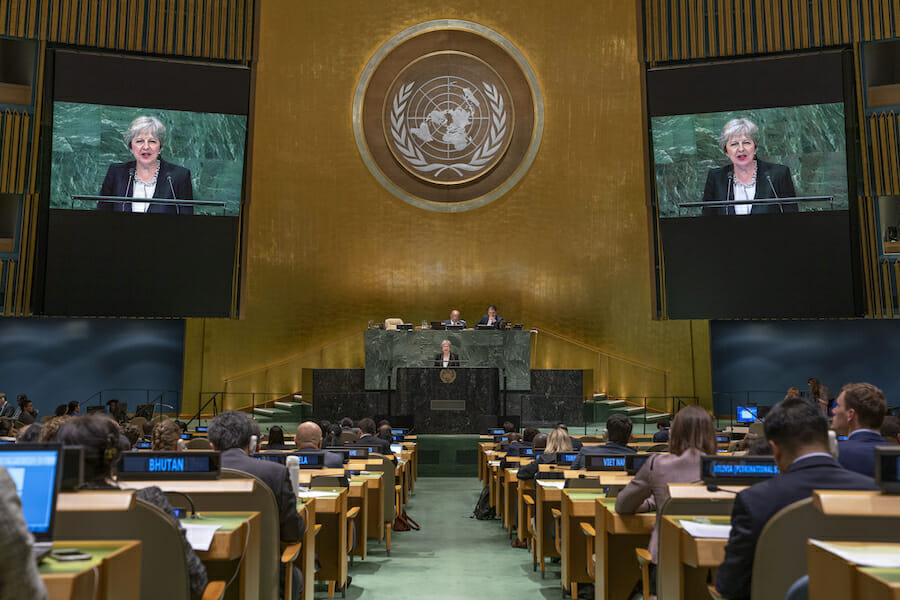
Napping at the United Nations
When I first entered Foreign Service, he was my first boss.
As a deputy director general, this man provided direct guidance and supervision but never forgot to motivate me to think critically and creatively. Even after being posted to New York for Vietnam’s mission at the UN, with a monstrous workload, he still checked up on me from time to time, motivating me to apply for a scholarship in the US. Therefore, I was initially delighted upon hearing that he made the headlines last week, thinking that it was because of his contributions, until I found out that it was not.
The picture of him at the General Assembly meeting in New York this last week was featured by CNN, which wrote, “a member of the Vietnamese delegation naps during Tuesday’s proceedings.” The photo was also for sale for almost $500 on Getty Images, stating that it was taken during the general debate of the 73rd session. Regardless of the caption, it took Vietnam’s social media by storm.
Internet users were quick to spread the photo around with trolling comments. Some called it unprofessional. Some said it was a waste of public fund and taxpayers’ money sending such a representative to international platforms. The harsher of the online trolls condemned it as an act of smearing the national pride of Vietnam. And of course, as usual, the anti-government agencies (mostly based abroad) took this chance to raise the legitimacy of the government itself. These comments miss one crucial element: context.
Context #1: multilateral diplomacy. At such forums like the UN, what is on public display does not necessarily means what is most important. It is the follow-up activities, side communications, note exchanging and lobbying that occasionally matter more. The speeches are already circulated beforehand to member countries and delegations only choose to attend the sessions that they are most concerned about. Therefore, during the seemingly “official” debate session, what will be said (the formal speeches) is usually expected and hence might be neglected. Team members reserve their energy and focus for the behind-the-scenes business.
Context #2: common practice. The General Assembly debate is not actually a ‘debate,’ but rather an opportunity for leaders to deliver their keynote speeches, reminding others of their main priorities and messages. Those posted at the UN mission are a part of the preparation that the teams to put together which could be subject to last-minute changes during the night before and, sometimes, even before the G-hour. In addition, the posed diplomats are also in charge of the logistic services for the whole visiting delegation from their home country, from accommodation and transportation to the follow-up agenda and sending cables home. That strenuous process could last until the night before so it is not unusual for the preparation team to rest when they can.
Former French ambassador to the UN, Alain Dejammet, after his mission published a book titled, Dormir aux Nations Unies (or “Sleeping at the United Nations”), which details that snoozing is not only a common thing to do at the UN due to long-hour sessions but he also conducted a secret survey with other French diplomats regarding recommendations on “snoozing spots” within the UN building. Obviously, reality has proven this was not only the norm applied to members of the mission but also the heads of state, including British PM Gordon Brown (at a UN Security Council meeting!), and Zimbabwean President Robert Mugabe.
Context #3: media (or political?) manipulation. The “viral” version of the photo, with him in center and the electronic sign “Vietnam,” accompanied by the caption “during Tuesday’s proceedings.” What it has left out was the fact that it was not necessarily during the proceeding but actually during the break between sessions. This was confirmed after my asking those inside the circle. The original version of the photo, before being cropped out, shows a woman using her phone in the back, in a rather “about to leave” fashion, confirming this situation. One cannot help but wonder if the cropping out and the caption was merely a moment of hastiness or a deliberate attempt to deliver a certain point.
After considering those three key contexts, the question is whether such an online backlash necessary? Of course, it is still better to not “get caught.” But even if the camera does not let it slip, it is advisable to consider the nature of the situation, of the common practice and of a multilateral forum like the UN, even more so to treat it with wit and light-hearted humor like the French ambassador did. Using that moment to put forward a narrative of questioning a person’s integrity and skills, the nation’s diplomacy qualifications and the government’s legitimacy is just a rather sad unfounded narrative.

